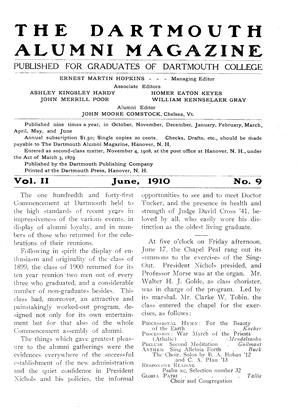SPEECH IN BEHALF OF THE CLASS OF 1911, ON RECEIVING THE SENIOR FENCE
June, 1910 Harry Butler '11Members of the Class of Nineteen Hundred and Ten:
The class of nineteen hundred and eleven accepts this fence, and pledges itself to treasure these rails and posts as a real possession. The class farther promises to foster and perpetuate the legacies of tradition and sentiment which surround and are embodied in this material form:
The change from underclassmen to Seniors is a change from the preparatory period to the period of obligation to prepare others, and more than carrying out the mere functions which we have learned to be our duty during the year to come, it is necessary that we .share with the lower classes the lessons of undergraduate life, which have been taught us by those who have preceded us in our college course.
The instruction that our class has received has come through many avenues, in intercollegiate athletics for instance, through many victories and some defeats, through bonfires, and class sings. In our time the summer baseball rule, and the freshman rule have been adopted. The new gymnasium has been started. We have come to share our love and devotion for an outgoing with an incoming president. The classes of nineteen hundred and eight, nineteen hundred and nine, and nineteen hundred and ten have formed the models in organization which we have attempted to follow.
These defining forces, together with many pleasing incidents of the last three years, have' served to develop in our class one leading characteristic, the principle of close fellowship among ourselves, and a broad acquaintanceship throughout the College. This has been emphasized most conspicuously, perhaps, by the class smoker which we held this spring, a departure from the usual custom, but a spontaneous expression of our desire for a more intimate association with each other, and a more general friendship with the members of the other classes.
And yet, in the opinions of a few of the friends of our College, who have watched its development with keen interest, some of the recent changes are considered unfortunate. To them the characteristic communism of Dartmouth undergraduate life seems to be the sacrifice made in the coming of our modified conditions. The belief has been expressed, that we are departing from that of which our alumni boasts, that which defines the broadening influence of our institution, Dartmouth democracy. For instance, the fear is based upon the recent introduction of society houses, the influence of which will increase with, the increase in their numbers. But with this in its effect we must also'class our athletic field, and the new gymnasium, which are necessarily placed at a distance from this campus. All have resulted in broadening the area over which our activities and diversions are spread. The equalizing effect of this campus, when it served as the football field, the baseball diamond, and as the recreation ground for every one, that effect has been lessened to a large extent. Formerly every student activity was so concentrated here, that a person was carried along in the course of common events whether he wished it or not. Men developed almost unconsciously that degree of binding friendship, to which we aspire today.
Undoubtedly, in our present surroundings, there are a few tendencies which could at some time be joined with others, and present to us the peculiar situation in Hanover of student differences, petty and despicable social codes. There is unquestionably more opportunity for the recluse to live practically alone. The cliquey instincts of some men, although not tolerated, may perhaps eke out an existence here.
But true democracy among us has not changed, for simply the agent of its development has to a large degree left its more natural home in this campus and thrown itself upon our student organizations for preservation. The customs and forms which we carry out from year to year, center themselves now as before in this common and those things for which it stands. But for the purposes of real fellowship and acquaintanceship a man could spend a year near this fence, and accomplish little compared to what he might have achieved formerly. However, let that same man enter into the organization of his class, get into the communion which accompanies victory, and what is more important, let him be receptive to the ideals which are placed about him and to the broad spirit which it is the duty of every upperclassman to impart to him. Let him do these things, and that which comes down to us from the old will not be lost in the rising of the new: Dartmouth spirit, with its greater Dartmouth democracy, as symbolized in this fence, will be one and the same.
The class of nineteen hundred and eleven, under the instruction of three previous classes, has learned this lesson, and now it remains for it, in the role of a friendly teacher, to share this acquirement with the classes which are to follow. This, as it has strength, it will strive to do.
THE REVEREND SAMUEL PENNIMAN LEEDS, D. D. Minister of the Church of Christ at Dartmouth College December 16, 1860—June 25, 1910
 View Full Issue
View Full Issue
More From This Issue
-
 Article
ArticleThe one hundredth and forty-first
June 1910 -
 Article
ArticleTHE CONFERRING OF DEGREES
June 1910 By Frederick C. Allen, -
 Article
ArticleSAMUEL PENNIMAN LEEDS
June 1910 By William Jewett Tucker -
 Article
ArticlePRESIDENT NICHOLS' ADDRESS AT COMMENCEMENT VESPERS
June 1910 -
 Class Notes
Class NotesLOCAL ASSOCIATIONS
June 1910 -
 Class Notes
Class NotesCLASS OF 1860
June 1910 By Arthur Little









